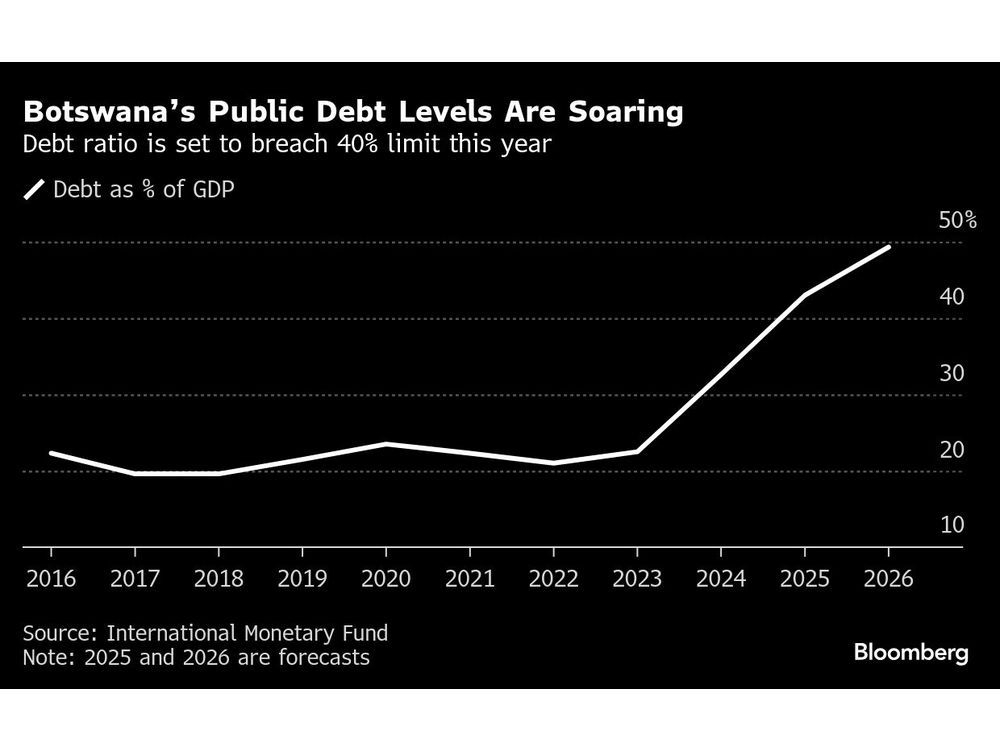Business
Botswana Faces Economic Crisis as Lab-Grown Diamonds Disrupt Market

Botswana is currently grappling with a significant economic downturn, largely attributed to the rise of lab-grown diamonds, which are undermining the traditional diamond market that has long been the backbone of the country’s economy. The impact is visible across the nation, as government clinics experience longer patient queues, construction firms reduce their workforce, and university students threaten to boycott classes over unmet financial promises.
Once celebrated for its vast diamond deposits, Botswana has seen its economic fortunes shift dramatically. The discovery of diamonds in 1967 transformed this sparsely populated nation of 2.5 million into one of the wealthiest per capita in sub-Saharan Africa. However, as the market for natural diamonds falters, the economic model built on this single commodity is facing critical challenges.
Economic Decline and Social Impact
President Duma Boko highlighted the gravity of the situation in an August speech, stating, “For decades, we have leaned and relied heavily on diamonds. While they served us well, we know painfully today that this model has reached its limits. This is no longer an economic challenge alone; it is a national social existential threat.” As consumer preferences shift towards less expensive lab-grown alternatives, the natural diamond market is experiencing severe disruptions.
Recent data indicates that lab-grown diamonds accounted for nearly half of engagement ring purchases in the United States in 2022, a staggering increase from just 5% in 2019, according to jewelry insurer BriteCo Inc. This trend, combined with a downturn in luxury retail in China and the impact of U.S. tariffs, has resulted in a significant decline in demand for Botswana’s natural diamonds, which provide approximately 80% of the country’s export revenue and a third of government income.
The challenges extend beyond the diamond industry. Construction companies, which have historically thrived on government contracts, are also feeling the pinch. Many have had to lay off workers, and some have ceased operations entirely due to reduced government spending. “Most of our members have had to retrench workers,” stated Tshotlego Kagiso, chairman of the Tshipidi Badiri Builders Association. The association, which once boasted over 800 members, is now seeing many unable to pay membership fees.
Government Response and Future Outlook
In response to the crisis, Botswana’s government is taking steps to diversify its economy. In July, the administration enlisted PEMANDU Associates, a Malaysian consultancy, to assist in this effort. Additionally, Boko announced a proposed $12 billion investment from Al Mansour Holdings, although details remain scarce regarding the deployment of these funds.
The financial landscape is becoming increasingly precarious. The International Monetary Fund projects that Botswana’s fiscal deficit could reach 11% of gross domestic product (GDP) by 2025, the largest budget gap since the global financial crisis of 2009. Moreover, the country’s debt is expected to soar to 43% of GDP during the same period, raising concerns regarding its investment-grade credit rating.
As the situation worsens, the government has declared a public health emergency. Reports indicate shortages in medications and medical supplies, with citizens expressing frustration over lengthy wait times at clinics. One patient, Galeemiswe Mosheti, a 42-year-old with diabetes, described waiting up to eight hours for treatment, compared to just one hour a year prior, highlighting the human cost of the economic downturn.
While Botswana has attempted to diversify its economy since its first president, Seretse Khama, established the Botswana Development Corporation in 1970, tangible progress remains elusive. The tourism sector, which focuses on luxury safaris and is the second-largest contributor to GDP, still only accounts for 12%. Efforts to develop copper mines and tap into the country’s vast coal reserves have not yet attracted the necessary investment.
With youth unemployment exceeding 40% and a workforce increasingly reliant on government support, the need for effective job creation strategies is urgent. Boko has outlined plans for investments in renewable energy, technology, and agriculture, yet the current economic landscape casts doubt on the feasibility of these ambitions.
As Botswana confronts this multifaceted crisis, experts caution that the country’s reliance on diamonds may hinder its economic recovery. “The diamond sector is under severe pressure — both prices and volumes,” noted Ravi Bhatia, director at S&P Global Ratings. “They’re doing a combination of trying to diversify, fiscal consolidation and also austerity.”
For Botswana, the path forward remains uncertain. The nation must navigate the complexities of a shifting global market while addressing the immediate social and economic challenges faced by its citizens. The lessons learned from its dependence on diamonds may serve as a cautionary tale for other economies similarly reliant on single commodities.
-

 Science2 months ago
Science2 months agoToyoake City Proposes Daily Two-Hour Smartphone Use Limit
-

 Health2 months ago
Health2 months agoB.C. Review Reveals Urgent Need for Rare-Disease Drug Reforms
-

 Top Stories2 months ago
Top Stories2 months agoPedestrian Fatally Injured in Esquimalt Collision on August 14
-

 Technology2 months ago
Technology2 months agoDark Adventure Game “Bye Sweet Carole” Set for October Release
-

 World2 months ago
World2 months agoJimmy Lai’s Defense Challenges Charges Under National Security Law
-

 Technology2 months ago
Technology2 months agoKonami Revives Iconic Metal Gear Solid Delta Ahead of Release
-

 Technology2 months ago
Technology2 months agoSnapmaker U1 Color 3D Printer Redefines Speed and Sustainability
-

 Technology2 months ago
Technology2 months agoAION Folding Knife: Redefining EDC Design with Premium Materials
-

 Technology2 months ago
Technology2 months agoSolve Today’s Wordle Challenge: Hints and Answer for August 19
-

 Business2 months ago
Business2 months agoGordon Murray Automotive Unveils S1 LM and Le Mans GTR at Monterey
-

 Lifestyle2 months ago
Lifestyle2 months agoVictoria’s Pop-Up Shop Shines Light on B.C.’s Wolf Cull
-

 Technology2 months ago
Technology2 months agoApple Expands Self-Service Repair Program to Canada









